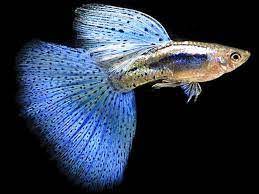Before this week I could tell you two things about guppies. They are small and they are popular for freshwater aquarium enthusiasts. It wasn't until I came across this paper published in the Journal of Genome Biology and Evolution about how guppies are being used to investigate sex chromosome differentiation that I realized just how cool they are. This was not a topic I was well versed in but I thought the paper was interesting so I went ahead and did some investigating for myself to learn more about this subject.
As many people are undoubtedly already familiar from their high school biology class, sex chromosomes, also referred to as allosomes, are what determine the sex of an organism. In humans typically XY develops male characteristics and XX develops female characteristics. This is an oversimplified version of the biology behind sex; in fact sex is not binary and biologists have for years viewed it more as a spectrum. Sex determination in humans (whether or not a chromosome becomes X or Y) is sort of understood by scientists through the discovery of the SRY gene. Some animals share similar methods of sex determination to us, whereas others have systems that are completely wild that researchers are still scratching their heads about it.
So although we understand a little bit about how sex chromosomes work, scientists are still looking for answers on how this system evolved. Enter the guppy, whose allosomes are similar enough to human's that they make for a great organisms to look into this. The chromosome carrying the sex determining gene have evolved regions that are non-recombining, meaning that some portions of the DNA does not become rearranged unlike in regular chromosomes. This recombination suppression allows for the differences between X and Y chromosomes in their shape and size in addition to making the Y chromosome lose its gene functions, making it "genetically degenerate."
If that was a lot to read, I understand. I spent quite a bit making sure I was getting all the details correct.
To simplify:
No genetic recombination --> Y chromosome's genes are functionless
Yes genetic recombination --> Y chromosomes's genes have (at least some) function
The key difference that makes the guppy unique for looking into this topic is that their Y-chromosome is not fully degenerated like humans as a result of incomplete recombination suppression. Thus researchers, like in the paper I mentioned at the start, have used guppy species to analyze which situations accelerate or obstruct chromosome degeneration. Under normal circumstances the Y chromosome has a higher rate of mutation making it more likely to be sometimes evolutionarily disadvantageous. Therefore, having some recombination can lead to the Y chromosome to have the same rate of mutations as its X pairing making it a little more stable.
The researchers of the paper actually go into a lot more detail by comparing three different guppy species' sex chromosomes, which they used to build phylogenetic trees to get a better understanding of when exactly recombination suppression developed. Their main point, besides that having not fully degenerated Y chromosomes can be beneficial for the guppy, is that the process behind recombination suppression is older than evolutionary biologists had once thought. So when exactly did it start? Who knows? Maybe more research into organisms like the guppy can provide us the answers! Overall though, these are important topics. Looking into the evolutionary history of sex chromosomes using species like the guppy can help us better understand our own biology and the complexity behind the development of sexes throughout the animal kingdom.




This article is hard asf
ReplyDeleteFelicidades Ian, muy interesante!!
ReplyDeleteExcelente artículo.
ReplyDelete